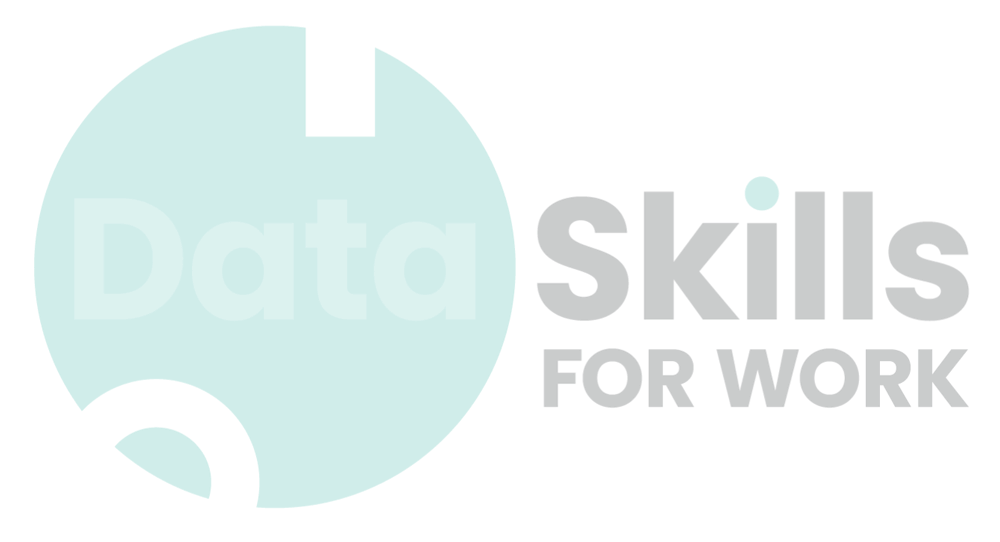This involves looking at different types (qualitative/quantitative) and features of data, such as accuracy, completeness and sample size, helping to assess its quality, spot errors, and interpret it into meaningful findings.
Read MoreMany organisations are at an early stage of their data journey. Before they can truly embark on this, they first need to gain an understanding of how data can transform their organisation or sector.
Read MoreLearners will be able to assess the ethical implications of using data to drive decision making, including an understanding of bias/prejudice and what impact this can have on data science work.
Read MoreUsing data analysis tools to explore and take meaning from data, make calculations (from taking averages to advanced analytical models) and select suitable visualisations, using commonly used platforms (particularly Excel at Citizen and Worker level).
Read MoreAfter gaining this skill, learners will have an understanding of why data is becoming more important, its impact, common sources of data, and how it is used (and misused) by individuals, organisations and across society.
Read MoreThis will ntroduce learners to the vocabulary used in data science and analytics and give them an understanding of the different data roles in an organisation.
Read MoreData architects work to specify organisational requirements and design and develop data systems that respond to them. They therefore have a detailed knowledge of the data flow and data processes in an organisation, and can utilise this to support improvements.
Read MoreAn awareness of relevant legislation is important for everyone producing and handling data, particularly personal data. This includes national and international regulations, what data can be shared/published, and approaches to ensuring data is held securely.
Read MoreVisualising data to provide insight and tell stories through data. At Data Professional level, this would involve looking at more advanced techniques and specialist platforms.
Read MoreUsing a geographical information system (GIS) to import, edit, manipulate and present data.
Read MoreAn introduction to data science programming languages (the research indicates Python and SQL are in highest demand), and the fundamentals of using programming for data engineering and analysis.
Read MoreData Professionals often require an ability to take analytics a step further, using programming skills. This competency builds on existing programming skills, with an ability to use these for data collection, analysis, quality checking, and modelling in a wide variety of contexts.
Read MoreData governance is an important consideration for those involved in supervising/governing the actions of others in an organisation in relation to data. This includes ensuring data integrity (data standards) and usability throughout its lifecycle (data flow), compliance with legislation, and ensuring processes are in place and followed by others.
Read MoreData engineers develop and maintain data systems. There is a recognised shortage of people with skills in this area, which the employer research confirmed. Data engineers have the knowledge and skills to design, develop, test, evaluate and modify data engineering solutions, choosing appropriate data sources and analysis tools.
Read MoreThis is a new and emerging area that some employers are keen to move into. Learners will gain an understanding of different modelling techniques, how to apply them, and an ability to translate this into usable insights and communicate the results.
Read MoreHow do you build and manage an effective data science team within an organisation? It is clear that while there is a great deal of enthusiasm about advancing the role of data, not all organisations have a clear understanding of the skills they need and why.
Read MoreWhat data does the organisation have, what data is important, and how can you go about driving value from it? This is what a data strategy seeks to set out – looking at job roles, responsibility, infrastructure, organisational culture, policies, and regulatory compliance – setting out a plan for data-driven innovation.
Read MoreHow to think through organisational issues/problems, develop research questions, and explore data-driven solutions to them (service design) – and how to support others within the organisation to make the most of their data team.
Read MoreHow to engage audiences with data, written and verbal communication skills, making visualisations and data insight understandable to and usable by different audiences, including those at Data Citizen and Data Worker level within their own organisation.
Read More











